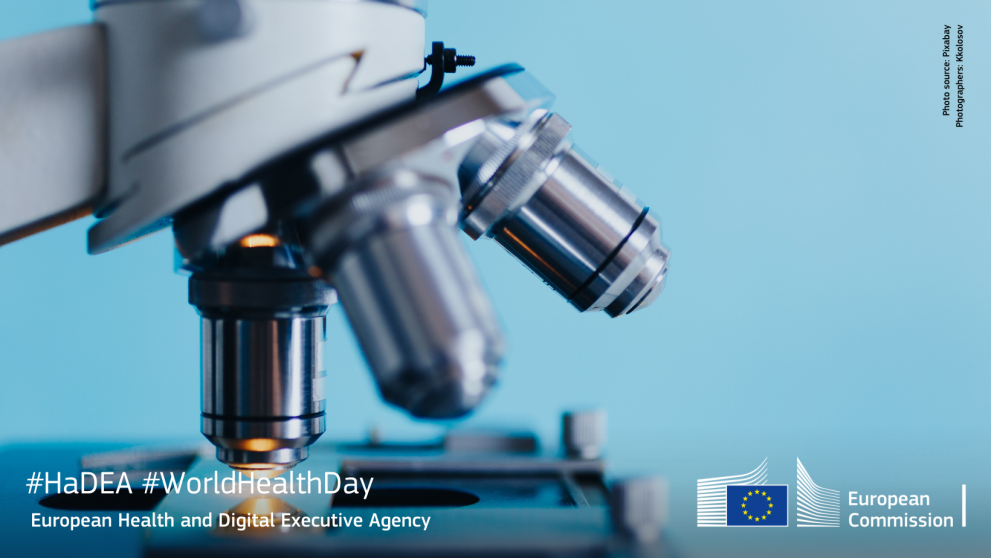
On World Health Day we highlighted some of the projects that we have supported in the field of health research and innovation.
As addressed in our dedicated article, Health is a priority in the EU, with the European Commission building a stronger European Health Union and investing in health research, technology and innovation in many areas.
In light of this approach, under Horizon 2020 first, and Horizon Europe Cluster 4 – Industry later, HaDEA supports the implementation of scientific projects to accelerate the green and digital transitions and to increase the EU’s autonomy in key strategic value chains for a resilient industry. The health industry is part of this transition with projects on the fields of Organ-on-Chip and scaffolds for tissue regeneration and repair.
‘Organ-on-Chip’ (OoC) is a promising technology to achieve more effective in-vitro research in a broad range of life science sectors, including medicine and pharmacy, cosmetics, agriculture and food. It also crucial for chemical safety testing including regulatory testing. More effective drug development, efficacy and safety screening, would reduce the need for animal testing and clinical testing. Nevertheless, much more research and development is needed to develop more robust, automated and parallelised OoC technologies that are applicable in industry.
What are the applications of biomaterials?
When addressing biological scaffolds for tissue regeneration, the increasing availability of novel biomaterials with tissue regeneration properties offers the solution for many diseases, including those of a degenerative nature, particularly as integral parts of advanced therapy medicinal products or medical devices. The design of new biomaterials capable of inducing tissue specific regeneration as elements of these medical technologies, results from their increasing fusion and combination. The production of these technologies is highly warranted. EU intervention in this field is required to achieve this goal and thereby develop new and innovative affordable technologies delivering personalised services.
The Projects
Discover how some of the Horizon 2020 projects managed by HaDEA contribute to strengthen the health industry:
- FLAMIN-GO: Rheumatoid arthritis (RA) is an autoimmune inflammatory disorder, primarily characterized by synovial joint inflammation, affecting ~0.5 to 1% of the overall population (~2900000 patients in the EU). It is more common in women than men (3:1). Response to current drugs is far from optimal, necessitating better treatments. The FLAMIN-GO project proposes to overcome conventional clinical trials for testing the efficacy of novel treatment modalities through the development of an organ-on-chip platform. The FLAMIN-GO approach uses patient biopsies to construct 3D models which mimic the complexity of the RA joint and can be tailored for each individual patient. The idea is to use these models for optimal drug identification in less than two months, offering a faster, more cost-effective and ethically sound approach for drug screening.
- I-SMarD: The project aims to the sustainable development (i.e. design, fabrication and evaluation) of the next generation dental implants, using advanced manufacturing techniques and novel nanomaterials. Over 40% of dental implant cases will lead to peri-implantitis, an inflammatory condition caused by bacterial colonisation that affects the tissue and bone around the implant. To address this problem, the I-SMarD project develops multi-functional dental implants that can respond to environmental threats such as bacteria by releasing nanoparticles and antibiotics. Moreover, they will match the anatomical characteristics of dental tissues and offer the potential to monitor the healing process after surgery.
- TUMOR-LN-oC: The lymphatic system is an integral part of the adaptive immune system and, in many cases, tumours use lymphatic vessels to spread and colonise downstream lymph nodes (LNs). This project is finding a solution for a robust, automated tumour–lymph node-on-chip platform able to connect primary tumours and LN tissue obtained from the same cancer patient. The project uses advances in the fields of microfluidics, cell biology, cancer biology, physics and computer programming to study the interaction of primary tumours with LNs and offer personalised treatment based on molecular characterisation of metastasising cells. Tumor-LN-oC focuses on the development and validation of a node-on-chip platform composed of 3D tissue models and microfluidic chips which will connect surgically removed, human primary tumours and lymph node tissue from the same lung cancer patient.
- EMAPS: With cardiovascular diseases (CVDs) accounting for 45% of all deaths in Europe, costing the EU economy EUR 210 billion a year, finding better and cost-efficient treatments is a priority. Bad news is that only four drugs targeting CVDs have been approved in the last decade. Efforts to accelerate drug development are urgently needed. The EMAPS-Cardio project aims to develop a new organ-on-chip platform for growth and maturation of cardiac micro tissues for adult-like organotypic models in healthy and diseased states. Also, the increased sensitivity and accuracy of organ-on-chip devices is a needed leap in technology that will accelerate new drug development without the need for animal models.
Background information
Horizon 2020 (H2020) was the EU’s multiannual funding programme between 2014 and 2020. H2020 provided Research and Innovation (R&I) funding for multi-national collaboration projects as well as for individual researchers and SMEs via special funding instruments. Horizon 2020 has been replaced by the Horizon Europe programme, which will run until 2027.
Relevant links
Health research and innovation | European Commission (europa.eu)
Details
- Publication date
- 13 April 2022
- Author
- European Health and Digital Executive Agency
- Programme Sector
- Health
- Digital
- Industry
- Programme
- Horizon Europe
- Horizon Europe Cluster 1: Health
- Horizon Europe Cluster 4: Industry
- Horizon Europe Cluster 4: Digital
- Tags
- Digital technology
- EUFunded
- HealthUnion
- Innovation
- Medical research
- Scientific research
